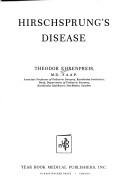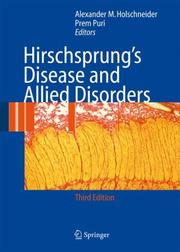| Listing 1 - 6 of 6 |
Sort by
|

ISBN: 0815130252 Year: 1970 Publisher: Chicago (Ill.): Year book medical publ.
Abstract | Keywords | Export | Availability | Bookmark
 Loading...
Loading...Choose an application
- Reference Manager
- EndNote
- RefWorks (Direct export to RefWorks)
Book
Year: 2010 Publisher: [Bethesda, Md]. : U.S. Dept. of Health and Human Services, National Institutes of Health, National Institute of Diabetes and Digestive Diseases and Kidney Diseases, National Digestive Diseases Information Clearinghouse,
Abstract | Keywords | Export | Availability | Bookmark
 Loading...
Loading...Choose an application
- Reference Manager
- EndNote
- RefWorks (Direct export to RefWorks)
Book
ISBN: 9791030303698 Year: 2023 Publisher: Montpellier: Sauramps Médical,
Abstract | Keywords | Export | Availability | Bookmark
 Loading...
Loading...Choose an application
- Reference Manager
- EndNote
- RefWorks (Direct export to RefWorks)
La première description de la maladie de Hirschsprung a été faite par Ruysch en 1691, puis elle a été précisée par le pédiatre danois Harald Hirschsprung [1] (1830-1916) au congrès de Berlin de 1886. Le segment colique monstrueusement dilaté a été tenu pour responsable de la symptomatologie pendant plus d'un demi-siècle, ce qui explique son ancienne appellation de mégacôlon congénital. Le traitement qui paraissait alors logique était la résection de ce colon dilaté. L'objectif de ce séminaire d'enseignement de la Société Française de Chirurgie Pédiatrique et du Collège National Hospitalo-Universitaire de Chirurgie Pédiatrique et de cette monographie sur la maladie de Hirschsprung est à la fois de détailler la prise en charge actuelle multidisciplinaire des patients atteints mais aussi de faire un état des lieux des progrès chirurgicaux, médicaux, génétiques et de l'avancée de la recherche dans le domaine, pour mieux comprendre cette malformation complexe et le retentissement sur les patients, et donc mieux prendre en charge ces enfants et leur famille. Je remercie vivement les auteurs et leurs équipes, français et étrangers, pour leur travail très didactique et complet. Ce livre sera un support très utile à l'amélioration de la prise en charge des patients atteints de la maladie de Hirschsprung. Je remercie aussi les membres du comité scientifique de ce séminaire, Pr Bonnard et Dr Dariel, pour leur aide à l'élaboration du programme. Cet ouvrage est dédié aux enfants et à leur famille qui vivent cette maladie au quotidien et nous font confiance, en espérant parvenir à améliorer leur prise en charge à l'avenir.
Hirschsprung Disease --- Rare Diseases --- Hirschsprung's disease --- Intestines --- Maladie de Hirschsprung --- Intestins --- Enfants --- Maladie de Hirschsprung. --- Abnormalities --- Malformations. --- Maladies --- malformations.

ISBN: 1281139238 9786611139230 3540339353 3540339345 3642070477 Year: 2008 Publisher: Berlin, Heidelberg : Springer-Verlag,
Abstract | Keywords | Export | Availability | Bookmark
 Loading...
Loading...Choose an application
- Reference Manager
- EndNote
- RefWorks (Direct export to RefWorks)
Hirschsprung's Disease and Allied Disorders is the third edition of a comprehensive study of the neuronal disorders of the lower gastrointestinal tract in children. Important new studies and progress in research on bowel motility and motility disorders are covered in detail as well as new aspects concerning the embryology, functional anatomy of the enteric nervous system. In particular new insights have been received from the studies in the genetics of Hirschsprung's disease. Special emphasis is laid on new surgical techniques, especially on the laparoscopic approach in combination with Soave's or Duhamel's technique.
Hirschsprung's disease. --- Colon (Anatomy) --- Abnormalities. --- Achalasia, Pelvirectal --- Congenital megacolon --- Hirschsprung disease --- Megacolon, Congenital --- Myà's disease --- Pelvirectal achalasia --- Megacolon --- Pediatric gastroenterology --- Abnormalities --- Surgery. --- Pediatrics. --- Gastroenterology. --- Pediatric Surgery. --- Colorectal Surgery. --- Internal medicine --- Digestive organs --- Paediatrics --- Pediatric medicine --- Medicine --- Children --- Surgery, Primitive --- Diseases --- Health and hygiene --- Pediatric surgery. --- Rectum—Surgery . --- Gastroenterology . --- Pediatric surgery --- Surgery, Pediatric --- Treatment
Book
ISBN: 3030156478 303015646X Year: 2019 Publisher: Cham : Springer International Publishing : Imprint: Springer,
Abstract | Keywords | Export | Availability | Bookmark
 Loading...
Loading...Choose an application
- Reference Manager
- EndNote
- RefWorks (Direct export to RefWorks)
The fourth edition of this leading book provides an authoritative, comprehensive and complete account of the neuronal disorders of the lower gastrointestinal tract in children. The book has been thoroughly revised and updated to reflect major advances that have occurred both in the understanding as well as the treatment of Hirschsprung’s disease. Contents discuss the latest therapies such as stem cell therapies, the epidemiology and association with multiple endocrine neoplasia and approaches to diagnosis such as radiology and manometry as well as Hirschsprung’s disease in adolescents and adults. Surgical approaches are thoroughly covered and include a new chapter on intestinal transplantation options. The follow-up care and long-term outcomes of patients who have undergone therapy are also addressed in this edition. With several new chapters added and the contents updated and re-worked, this edition is authored by the leading current experts in their respective fields. It is a must-have book for pediatric surgeons, pediatricians, gastroenterologists, and colorectal surgeons.
Hirschsprung's disease. --- Achalasia, Pelvirectal --- Congenital megacolon --- Hirschsprung disease --- Megacolon, Congenital --- Myà's disease --- Pelvirectal achalasia --- Colon (Anatomy) --- Megacolon --- Pediatric gastroenterology --- Abnormalities --- Surgery. --- Gastroenterology. --- Pediatrics. --- Pediatric Surgery. --- Colorectal Surgery. --- Paediatrics --- Pediatric medicine --- Medicine --- Children --- Internal medicine --- Digestive organs --- Surgery, Primitive --- Diseases --- Health and hygiene --- Pediatric surgery. --- Gastroenterology . --- Rectum—Surgery . --- Pediatric surgery --- Surgery, Pediatric --- Treatment
Book
ISBN: 0691237077 9780691237077 Year: 2022 Publisher: Princeton, New Jersey ; Oxford : Princeton University Press,
Abstract | Keywords | Export | Availability | Bookmark
 Loading...
Loading...Choose an application
- Reference Manager
- EndNote
- RefWorks (Direct export to RefWorks)
A revelatory tale of how the human brain develops, from conception to birth and beyondBy the time a baby is born, its brain is equipped with billions of intricately crafted neurons wired together through trillions of interconnections to form a compact and breathtakingly efficient supercomputer. Zero to Birth takes you on an extraordinary journey to the very edge of creation, from the moment of an egg’s fertilization through each step of a human brain’s development in the womb—and even a little beyond.As pioneering experimental neurobiologist W. A. Harris guides you through the process of how the brain is built, he takes up the biggest questions that scientists have asked about the developing brain, describing many of the thrilling discoveries that were foundational to our current understanding. He weaves in a remarkable evolutionary story that begins billions of years ago in the Proterozoic eon, when multicellular animals first emerged from single-cell organisms, and reveals how the growth of a fetal brain over nine months reflects the brain’s evolution through the ages. Our brains have much in common with those of other animals, and Harris offers an illuminating look at how comparative animal studies have been crucial to understanding what makes a human brain human.An unforgettable chronicle of one of nature’s greatest achievements, Zero to Birth describes how the brain’s incredible feat of orchestrated growth ensures that every brain is unique, and how breakthroughs at the frontiers of science are helping us to decode many traits that only reveal themselves later in life.
SCIENCE / Life Sciences / Neuroscience. --- Action potential. --- Agrin. --- Angiogenesis. --- Antibody. --- Apoptosis. --- Astrocyte. --- Axon guidance. --- Axon. --- Blastula. --- Brain asymmetry. --- Broca's area. --- Cancer cell. --- Cell type. --- Cerebral atrophy. --- Cerebral cortex. --- Charles Darwin. --- Chemical synapse. --- Critical period. --- Cyclopamine. --- Degenerative disease. --- Dendrite. --- Down syndrome. --- Ectoderm. --- Embryo. --- Embryology. --- Endocrinology. --- Eric Knudsen. --- Evolution. --- FOXP2. --- Filopodia. --- Forebrain. --- Ganglion cell. --- Gastrulation. --- Gene. --- Growth cone. --- Hans Spemann. --- Hebbian theory. --- Hindbrain. --- Hirschsprung's disease. --- Homeosis. --- Hox gene. --- Human brain. --- Immortalised cell line. --- John Gurdon. --- Lancelot Hogben. --- Lateralization of brain function. --- Marian Diamond. --- Midbrain. --- Model organism. --- Morphogen. --- Motor neuron. --- Muscle. --- Myocyte. --- Nematode. --- Nervous tissue. --- Neural crest. --- Neural development. --- Neural plate. --- Neural stem cell. --- Neural tube defect. --- Neural tube. --- Neuroblast. --- Neuroblastoma. --- Neuroepithelial cell. --- Neuroglia. --- Neuroimaging. --- Neuron doctrine. --- Neuron. --- Organoid. --- Petri dish. --- Progenitor cell. --- Proneural genes. --- Protein. --- Protocadherin. --- Purkinje cell. --- Reeler. --- Reelin. --- Renshaw cell. --- Reticular theory. --- Retinoic acid. --- Roel Nusse. --- Ross Granville Harrison. --- Sarcoma. --- Sonic hedgehog. --- Spina bifida. --- Spinal cord. --- Spindle apparatus. --- Stem cell. --- Sydney Brenner. --- Synapsis. --- Synaptic plasticity. --- Thomas Hunt Morgan. --- Thrombospondin. --- Torsten Wiesel. --- Transformation (genetics). --- Twin. --- Vertebrate. --- Visual word form area. --- White blood cell. --- Zygote. --- Brain --- Growth. --- Neuronal Plasticity --- SCIENCE / Life Sciences / Neuroscience --- SCIENCE / Life Sciences / Developmental Biology --- growth & development --- embryology --- physiology
| Listing 1 - 6 of 6 |
Sort by
|

 Search
Search Feedback
Feedback About UniCat
About UniCat  Help
Help News
News